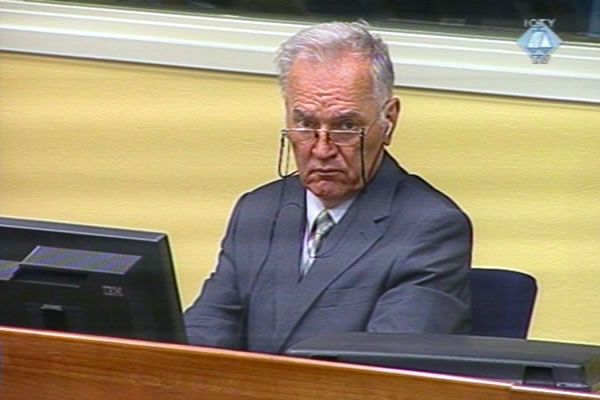Home
TESTIMONY OF INSIDER FROM MANJACA
A former member of the VRS security service described the conditions in the Manjaca prison camp at the trial of Ratko Mladic. The witness said that it was the ‘most regular' of all prison camps under the Bosnian Serb control. The camp employed a nutritionist. This is rather different from the witness’s daily reports from 1992 in which he called Manjaca the ‘house of terror’
 Ratko Mladic in the courtroom
Ratko Mladic in the courtroom The trial of Ratko Mladic continued today with the evidence of a protected witness, testifying under the pseudonym RM 051. He is a former member of the VRS Security Department who served in the Manjaca prison camp from June to December 1992. To protect the witness’s identity, his position in the camp was not disclosed. He was not ‘part of the management’, as the witness put it. The witness testified with image distortion to further protect his identity.
At the beginning of the hearing, the part of transcript of the witness’s evidence at the trial of former Bosnian Serb police officials Mico Stanisic and Stojan Zupljanin in January 2010 was admitted into evidence. The examination-in chief today mostly proceeded in private session. Also, a number of daily reports from 1992 were also admitted into evidence. In the reports, the witness described the conditions in Manjaca. In one of the reports the witness demands that all detainees younger than 18 and older than 60 be released from the camp because they ‘are not fit for military service’ and had been brought in ‘from their homes and fields’. They had never carried arms or taken part in combat, the witness said in the report. The witness also wanted the military police to be reminded that ‘Manjaca is not a house of terror’ but a POW camp; the POWs ‘should be treated humanely’.
In response to Miodrag Stojanovic’s questions, the witness tried to present Manjaca as a much more humane place than he had described in his reports. The witness said that prisoners were treated ‘properly’ and the position was that they ‘should leave the prison alive and healthy under their own power’. The witness maintained that the detainees received the same food as the Bosnian Serb army and even had a nutritionist who was there each day ‘from 9am to 5pm’. Sanitary conditions were modest because there wasn’t enough money. Prisoners could bathe once every seven to 15 days. Medical care was provided by two detainees who were medical doctors. Manjaca was thus ‘top of the list’ among the prison camps. Compared to other prison facilities under the Bosnian Serb control, it was ‘the most regular’, the witness said.
In one of the reports from late July 1992, the witness wrote that the detainees Omer Filipovic and Esad Bender were killed in the prison camp, laying the blame for the crime on military police officers. Today, the witness said it was a case of ‘utter lack of discipline that caught everyone by surprise’. Perpetrators were later identified and suspended. They were tried in Banja Luka, but ‘with a great delay’, the witness explained. The witness noted that it was the only incident in which someone was killed in Manjaca. In a report of 7 July 1992, the witness wrote that 24 detainees suffocated en route from Sanski Most to Manjaca. The witness claimed that police officers securing the convoy were responsible for that; it was up to the civilian judicial organs, not the military, to launch an investigation.
In the cross-examination, the witness said that the Manjaca camp was ‘an organizational unit’ of the 1st Krajina Corps; the VRS Main Staff, headed by Ratko Mladic, had jurisdiction over the camp through the chain of command. When the accused heard that, he shouted, ‘Not true, not true!’ and called his lawyer for consultations. In May 1992, the witness spent some time with Mladic in the Main Staff. He noticed that Mladic was ‘overworked’ and went to Pale every day to negotiate the pull-out of the troops from Sarajevo.
When the Manjaca prison camp was shut down in December 1992, the detainees ‘voluntarily’ signed statements asking to be transferred to ‘third countries’, the witness explained. The judges asked the witness if going back to their homes had been an option for the prisoners. They could do it but nevertheless almost ‘100 percent’ of them decided to go to third countries, the witness replied. The witness admitted that some of them later did return to their homes and some even joined the BH Army.
Protected witness RM 051 will complete his evidence tomorrow morning.
Linked Reports
- Case : Mladic
- 2012-09-21 POLICE RAN PRISON CAMP, ARMY TOOK PEOPLE TO DO FORCED LABOR
- 2012-09-20 MLADIC’S DEFENSE: TRNOPOLJE WAS ‘HUMANITARIAN CENTER’
- 2012-09-20 IMPRISONED BY HIS ERSTWHILE NEIGHBORS
- 2012-09-25 WHAT’S IN A ZERO?
- 2012-09-25 MURDERS IN FRONT OF MANJACA PRISON CAMP COMMAND
- 2012-09-26 MLADIC REFUSES TO FOLLOW WITNESS TESTIMONY VIA VIDEO LINK
